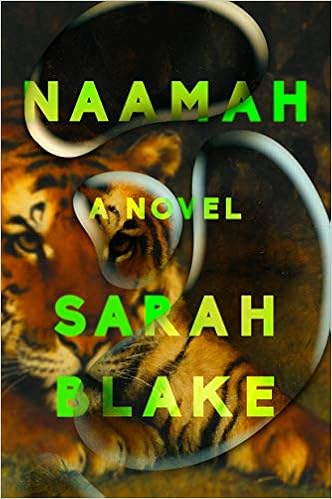This novel gives the perspective
of Naamah, Noah’s wife, as she and her family live on the ark waiting for the rain
to stop and the water to recede. Noah
built the ark but Naamah is the one whose job it seems to be to keep its
inhabitants alive so they can reconstruct the world. She deals with the daily practicalities of
life: feeding, cleaning, exercising, and
controlling the animals; she’s “the one who’s always plowing ahead, unfazed by
dead animals, broken doors, injured legs, the same food over and over.” After a problem is solved, Naamah finds
herself “still thinking fast, still feeling like she might have to jump to
action, save someone, sacrifice something.”
To escape the confines of life on
the ark, Naamah goes swimming. In the
water, surreal things happen. She comes
across a world inhabited by the dead where she plays with dead children. She also meets an angel with whom she has
sex. Naamah also has many dreams in
which she communicates with other beings, including God.
It is the many dream sequences
that are problematic. The boundaries
between reality and her dream world are blurred so it is difficult to determine
if what is being described is real. I
found myself often questioning the purpose of various dreams. The constant insertion of dreams fractures
the narrative and takes away any suspense.
Readers who enjoy lyrical writing will enjoy the dream sequences but I
found them more intrusive than revelatory.
This is very much a feminist retelling
of the Biblical story. The novel focuses
on the experiences of Naamah and her three daughters-in-law rather than on
those of Noah and the three sons.
Naamah, for example, mourns the dead; she finds herself “overwhelmed by
her new understanding of the deaths of the people God no longer wanted.” Repopulating the world becomes the
responsibility of the women and “Naamah wonders if God has considered
this: women so distrustful of Him that
they might never bear children for the new world.”
Distrustful is probably the best
word to describe Naamah’s relationship with God. It is this relationship which I found most
interesting in the novel. She does not
revere Him. She finds it difficult to
trust someone who let innocent children die in the flood; she shares the
opinion of a dead woman who says, “’I can’t imagine knowingly going to Him
after what He’s done.’” Naamah, like her
daughter-in-law Adata, has no firm belief “that they are ever far from God’s
grief.” Naamah is told that God cannot
be judged because He cannot be understood, but she says, “’I judge Him just the
same.’”
Naamah also has doubts about God’s
plan. Before the flood began, she was
told by Noah that God “’wants to wipe the earth clean, start fresh. He’s deemed everything wicked and evil. He’s seen too much violence. He thinks He got us wrong.’” That leads to her main question, “’How does
God get something wrong?’” She wonders
why she has been determined to be not wicked and so saved when she feels
otherwise. One night on the ark,
fireflies are seen and Japheth, the eldest son, says that God has called into
being things that were not, and Naamah replies, “’Yes! Yes!
Why is it, then, do you think, Japheth, that we should usher all these
animals, if he could just do that, on
the other side of the flood?’”
I think the premise of this novel
is interesting, but I was not impressed with the execution. The many surreal scenes detract from the
portrayal of a strong woman willing to question and scold God.

No comments:
Post a Comment